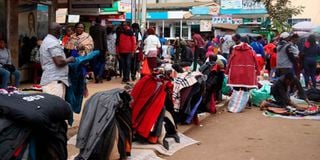Repeat poll or round one win is up to the undecided, polls show

Kenyans go about their business on Commercial Street in Thika, Kiambu County on July 21. Recent opinion polls show that the election outcome is likely to be decided by which candidate the undecided vote for or if they choose not to vote.
If the opinion polls were anything to go by, the presidential contest between Deputy President William Ruto and Azimio la Umoja One Kenya Coalition flag bearer Raila Odinga will be decided by undecided voters.
The two are seen as the main contenders in the race to succeed President Kenyatta.
While the pollsters’ definition of the undecided is not standard, their numbers show that the contest will have a winner in the first round if the undecided voters make up their minds, or if they abstain from voting altogether.

A first round win, of 50 per cent plus one, can only be achieved if the winner gets at least 8.63 million votes, assuming a voter turnout of at least 78 per cent, as was the case in 2017.
Voter turnout
But if the voter turnout jumps to the highs of the 2013 polls (86 per cent), a winner will have to garner at least 9.511 million, and 9.0694 million for an average of both (82 per cent turnout).
Kenya now has 22,120,458 registered voters spread across 46,229 polling stations.
For Infotrak, Dr Ruto had his highest score in May at 42 per cent, just two weeks before the candidates named their running mates—Rigathi Gachagua for Dr Ruto and Martha Karua for Mr Odinga. He then moved to 38 in June, a point less in July, and back to 42 per cent this month.
Mr Odinga has this month polled 49 per cent, up from 42 per cent in May.
The undecided voters are at 7 per cent, while the Roots party candidate Prof George Wajackoyah and his Agano counterpart Waihiga Mwaure are at 2 and 0.2 per cent, respectively.
On Tifa, Mr Odinga polled 46.7 per cent in their latest poll last week, with Dr Ruto at 44.4 per cent and the undecided at 10 per cent. While Mr Odinga moved from 27 per cent in February to his current tally, Dr Ruto has jumped six points from his 38 per cent tally at the same time.
The undecided, the poll showed, have dropped from 20 per cent in February 2022.
While almost all the polls have shown Dr Ruto and Mr Odinga below the 50 per cent plus one mark, two pollsters have had them over the edge in their polls.
Tifa and Infotrak
One is Intel Research Solutions (IRS), which says it has affiliate offices in Uganda and Tanzania and field contacts in 12 other countries in sub-Saharan Africa, and is led by Ms Karen Mwangi. She has previously worked for Tifa and Infotrak.
In the IRS poll, Dr Ruto has moved from 51.25 per cent on June 20, 49.9 per cent on July 4, 50.5 per cent on July 20 and 53.1 per cent on July 31. Mr Odinga, on the other hand, has over the same period moved from 42.5 per cent on June 20 and July 4, to 44.2 on July 20 and 42.7 per cent in the latest poll of July 31.
Another poll that has given a candidate more than 50 per cent of the poll is Centre for African Progress, which last week showed Mr Odinga and the DP at 52 per cent and 45 per cent respectively.
Ipsos, whose only poll this year was released yesterday, showed Mr Odinga at 47 per cent, with Dr Ruto at 41 per cent and the undecided at 3.8 per cent.





